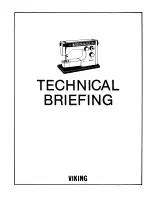
- 8 -
1.
DISASSEMBLING AND REASSEMBLING THE OUTER PARTS AND MAIN
PARTS
1.
Remove the screw securing the face plate, and the face plate by sliding it to the left.
2.
Remove the screw securing the free arm cover, and the free arm cover by sliding it to the left.
3.
Remove the blind cap on the belt cover, the screw securing the belt cover, and the belt cover from below by
sliding it to the right.
4.
Remove the two screws securing the base cover, slide the base cover to the left and then holding the front,
slide it to the left and out.
5.
Remove the screw securing the front cover (near spool pin), and loosen the two screws (below jaw section on
face plate side, below free arm). Open the front cover toward the front, remove the three connectors and then
the front cover.
6.
Remove the two screws securing the needle plate, and the needle plate.
7.
Remove the three screws securing the rear cover, and the rear cover from the rear side.
Disassembly Points
3.
To remove the belt cover, unhook the bottom catch (A), slide the belt cover to the right, then unhook the top
catches (B) by sliding the belt cover downward.
5.
To remove the front cover, slide part (C) downward, unhook the two catches (D) from the base plate and the
jaw section of the front cover (E) from the bottom of the thread guide, then pull the front cover away at the
front.
7.
To remove the screw (F) securing the rear cover, move the bobbin winder shaft to the right.
* Before removing the rear cover, lower the presser foot lifter.
Summary of Contents for BL7800
Page 1: ...4 2001...
Page 4: ...2 1 MECHANICAL CHART...
Page 9: ...7 1 DISASSEMBLING AND REASSEMBLING THE OUTER PARTS AND MAIN PARTS 8 2 LEAD WIRE ARRANGEMENT 19...
Page 15: ...13...
Page 17: ...15...
Page 19: ...17...
Page 21: ...19 2 LEAD WIRE ARRANGEMENT...
Page 43: ...41 Main PC board...
Page 44: ...42 Power supply unit Power 120 Power 230...
Page 45: ...43 Operation board Other PC boards...
Page 46: ...BL7800 T1010141...











































